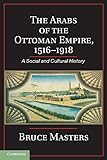The Arabs of the Ottoman Empire, 1516-1918 : a social and cultural history / Bruce Masters, Wesleyan University.
Material type: TextPublisher: Cambridge : Cambridge University Press, 2013Description: xiii, 261 pages ; 24 cmContent type: text Media type: unmediated Carrier type: volumeISBN: 9781107033634 (hardback)Subject(s): Arabs -- Turkey -- History | Ulama -- Turkey -- History | Elite (Social sciences) -- Turkey -- History | Social change -- Turkey -- History | HISTORY / Middle East / General | Turkey -- History -- Ottoman Empire, 1288-1918 | Turkey -- Intellectual lifeDDC classification: 305.892/705609034 LOC classification: DR435.A66 | M37 2013Other classification: HIS026000
TextPublisher: Cambridge : Cambridge University Press, 2013Description: xiii, 261 pages ; 24 cmContent type: text Media type: unmediated Carrier type: volumeISBN: 9781107033634 (hardback)Subject(s): Arabs -- Turkey -- History | Ulama -- Turkey -- History | Elite (Social sciences) -- Turkey -- History | Social change -- Turkey -- History | HISTORY / Middle East / General | Turkey -- History -- Ottoman Empire, 1288-1918 | Turkey -- Intellectual lifeDDC classification: 305.892/705609034 LOC classification: DR435.A66 | M37 2013Other classification: HIS026000 | Item type | Current library | Call number | Status | Date due | Barcode |
|---|---|---|---|---|---|
 Books
Books
|
The BIAA David H. French Library Shelf 62 - Reading Room | H2n MASTE 29975 | Not for loan | BOOKS*000000022909 |
Includes bibliographical references (pages 233-249) and index.
Machine generated contents note: 1. The establishment and survival of Ottoman rule in the Arab lands, 1516-1798; 2. Institutions of Ottoman rule; 3. Economy and society in the early modern era; 4. A world of scholars and saints: intellectual life in the Ottoman Arab lands; 5. The empire at war: Napoleon, the Wahhabis, and Mehmed Ali; 6. The Tanzimat and the time of re-Ottomanization; 7. The end of the relationship.
"The Ottomans ruled much of the Arab World for four centuries. Bruce Masters's work surveys this period, emphasizing the cultural and social changes that occurred against the backdrop of the political realities that Arabs experienced as subjects of the Ottoman sultans. The persistence of Ottoman rule over a vast area for several centuries required that some Arabs collaborate in the imperial enterprise. Masters highlights the role of two social classes that made the empire successful: the Sunni Muslim religious scholars, the ulama, and the urban notables, the acyan. Both groups identified with the Ottoman sultanate and were its firmest backers, although for different reasons. The ulama legitimated the Ottoman state as a righteous Muslim sultanate, while the acyan emerged as the dominant political and economic class in most Arab cities due to their connections to the regime. Together, the two helped to maintain the empire"-- Provided by publisher.
